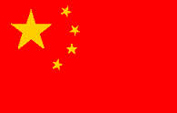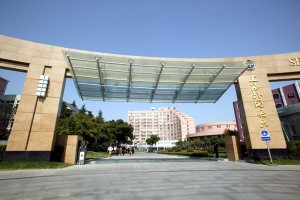by HAIYUN MA writes at ISLAMiCommentary :
This week China’s new president, Xi Jinping, separately hosted Israeli Prime Minister Benjamin Netanyahu and Palestine President Mahmoud Abbas — meetings that some analysts say is indicative of China’s desire for a more pro-active role in Middle East diplomacy.
The timing of the visits of Abbas and Netanyahu, in the context of the U.S. pivot to Asia and China’s tension with neighboring countries in East China Sea and South China Sea, also indicates that these visits to some extent are a diplomatic breakthrough for China. Chinese state media said this week’s visits emphasized China’s “active involvement in Middle East affairs and highlighted its role as a responsible power.”
A History of China’s Mideast Connections
Modern Chinese contact with the Middle East began at the turn of the 20th century when the Qing dynasty (1644-1911) and the Ottoman Empire (1299-1923) were undergoing chaotic transformations from empire to nation. A Beijing Imam, Wang Kuan, visited the Tu’erqi state or what is now Turkey and other Middle East countries in 1905-6 in order to better understand changes in the region and gain insight into how to build a modern Chinese Muslim society as the Qing dynasty was declining. [1]
Individual connections such as these paved the way for more official, cultural, and diplomatic communications between the newly established Republic of China (ROC, 1912- 1949 in mainland China, 1949 to present in Taiwan) and newly founded Arab countries, in particular Egypt.
In fact, it was Chinese Muslim intellectuals, students, and scholars who facilitated the granting of mutual “Most Favored Nation” status between the Republic of China and Egypt in 1930 (and the formal establishment of diplomatic relationship between the two countries in 1942).
The ROC government sent several groups of Chinese Muslim students to the prestigious Al-Azhar University in Cairo in 1931 when China faced Japanese invasions in Manchuria and Shanghai.[2] Chinese Muslims were entrusted by the Republican government to cultivate friendship with Arab and Muslim countries and to propagandize China’s resistance war. During their study at Al-Azhar, Chinese Muslim students took the opportunity of going to Hajj to win Arab Muslims’ sympathy with China.[3]
This engagement of Chinese Muslims with the Middle East during wartime laid the foundation for the development of Arabic language instruction and Middle East studies in Chinese universities after 1949. Immediately after the establishment of the People’s Republic of China, China deployed Chinese Muslims as a means of cultural diplomacy with the Middle East. Chinese Muslim scholars returning from Al-Azhar, including Ma Jian (Peking University), Na Zhong (Beijing Foreign Languages Studies University), and Pang Shiqian (China’s Islamic Association), went on to build Arabic and Islamic Studies programs in universities and religious institutes, which were directly involved in Chinese diplomacy towards the Arab countries of the Middle East.
Ma Jian deserves a special status in Middle East studies. He studied at Al-Azhar University in 1930s. It was on his initiative — when he returned to China from Egypt — that China’s official Arabic language program at Peking University was created in the 1940s. Blessed by his Arabic language expertise, Ma Jian translated many cultural texts and political documents concerning Sino-Arab relations. He served as translator for Chinese national leaders meeting Arab leaders. [4]
Several of Ma Jian’s exemplary students including Professor Zhu Weilie of Shanghai International Studies University are still influential in Arabic and Arab studies. The Zhu-led Shanghai International Studies University publishes a yearly report on Middle East Development, which has been a must-read reference for China’s Middle East diplomats and researchers. But his influence may be changing in face of the rise of China’s English-speaking Middle East experts.
Academic Transformation
It is well known that, on matters concerning Islam and Muslims today, China’s academia and media primarily depends on Western sources. This is concerning to Zhu who worries about the penetration of Western discourse into China’s Middle East studies programs, and is urging that China build its own discourse and framework on Middle East studies.[5]
Another professor at the same university, Ma Lirong, studies Chinese media coverage of Islam and Middle East Muslims and concludes that Chinese media coverage is deeply misled by Western discourses on Islam and Muslims.[6]
In fact Middle East studies in China today is increasingly beginning to resemble Middle East studies in the United States – with a distinctly American orientation, in terms of working language, which sources are consulted, and which theories are analyzed.
The symbiosis between Arabic language training and Middle East studies in China prior to the 1980s, and the distance and separation between the two since the 1990s imply two transformations in Middle East studies in China.
The first transformation was the decline of Arabic-language proficiency as a core component of Middle East studies. The multidisciplinary nature of the Middle East studies — from language, culture, and history, to economics and international relations — and the return of Western-educated scholars to China are quickly replacing their Arabic language-based Middle East-expert predecessors.
Since most Middle East experts in China, unlike their predecessors, are less likely to have received Arabic-language training, this prevents them from consulting Arabic sources directly in their research.
The second transformation was this dominance of English language sources and references.
Before China’s ‘Open Door Policy’ towards the West in 1980s, China’s Middle East experts, blessed by their expertise in the Arabic language and Islamic culture, had direct contact with their Arab counterparts and access to original sources.
China’s policy shift from supporting developing countries (under Mao) to developed countries (an economic development focus that began with Deng Xiaoping), was then reinforced by ‘Great Power Diplomacy’ after 1990 as rising China began to see itself as ‘one of them.’
This happened at the same time that Chinese knowledge about, and frame of reference on, the Middle East was becoming more reliant on information from Western media, academics and think-tanks.
There are multiple levels and kinds of Middle East research institutions and organizations in China: At the national level, the Chinese Academy of Social Sciences (CASS) is one of leading institutions on Sino-Middle East relations. The China Institute of International Relations (CIIS) is a government think tank affiliated with the Ministry of Foreign Affairs. The China Institute of Contemporary International Relations (CICIR), another government think tank is under the umbrella of the Ministry of State Security (MSS). All these above-mentioned national and professional institutions are located in Beijing and their influence dominates Sino-Middle East policy.
There are also many regional research centers or institutions for Sino-Middle East studies. As China’s major economic center, Shanghai hosts several regional institutes working on Middle East studies, which include the Shanghai Academy of Social Sciences (SASS) and the Shanghai Institute for International Studies (SIIS). Shanghai’s SASS has an Institute of European and Asian Studies (IEAS) whose focus is on Jewish studies due to the historical presence of Jewish community in Shanghai. Shanghai indeed has become central to Israel’s lobbying effort in China.
It is not surprising, therefore, that Netanyahu visited Shanghai this time to thank the Chinese people for protecting the Jews during the WWII in Shanghai and expressed the hope that Shanghai represents the future of China and the World and that Israel would be part of the future of the world.[7]
Since the establishment of diplomatic relations in 1992, China’s Middle East scholars have frequently traveled to Israel through various connections, programs, and fellowships. The Israeli Embassy in Beijing often invites China’s Middle East experts to attend various cultural events and provides materials on the Middle East.
The U.S. became central to training China’s experts in the humanities and social sciences after the 1980s. Major American research institutions who are actively engaged in scholarly exchange with Chinese Middle East experts include the Center for Strategic and International Studies, Woodrow Wilson Center, Kissinger Institute on China and the United States, and the Washington Institute for Near East Policy.
China’s Middle East studies scholars and experts, especially at think-tanks, highlight Sino-US cooperation, instead of competition, in the Middle East.
As illustrated in the “vital triangle” relations theory put forth by Jon Alterman, Director of the Middle East Program at CSIS, “rather than be a source of tension, the keenly shared U.S. and Chinese interests in Gulf security means that the region can be a locus of cooperation between the two sides, working in partnership with host governments.”
(Also noteworthy, despite the frequency of visits of Chinese Middle East experts to the U.S., many Chinese scholars, researchers, and policy makers I interviewed in 2009 and 2010 in Beijing, Shanghai, and other cities have little concept of academic politics in the U.S.; how the specific vision and mission of the institution he/she is connected to impacts their research.)
A closer look at the biographies of nine leading Middle East Studies experts — at Peking University, Shanghai International Studies University, Chinese Academy of Social Sciences (CASS), the China Institute of International Studies (CIIS), the China Institute of Contemporary International Relations (CICIR), and the Shanghai Institute for International Studies (SIIS) — indicates that six studied or were trained in the U.S. or/and Israel, two language scholars frequently visit Arab countries, and one scholar visited both Israel and Arab countries.
China, Palestine, and Israel


When the PLO established the Palestine Authority in 1988, China quickly recognized it, and the PLO’s Beijing office was upgraded to Embassy of Palestine. China subsequently set up the Chinese Embassy to Palestine, first in Tunisia in 1990, then in Gaza in 1995, and finally relocated to Ramallah in 2004.
Chinese President Xi Jinping summarized, in his meeting with Abbas this week, four key guidelines for solving the Palestine issue: 1. China’s belief in the establishment of an independent Palestinian State with East Jerusalem [8]as its capital and peaceful coexistence with Israel; 2. Negotiation as the only means to realize peace between Palestine and Israel, not the use of military force; 3. An upholding of the “land for peace” principle by both parties; and 4. Assistance by the international community in pushing the peace process forward.
Closer scrutiny of these guidelines indicates that while China has expressed support for providing logistical support for the building of an independent Palestine, it is against armed resistance to Israel (and thus indirectly, for the disarming of Hamas), and silently recognizes and accepts the 1967 borders with West Jerusalem as the Israeli capital.
According to the official (Chinese) Xinhua News Agency, Chinese Premier Li Keqiang told Netanyahu this week that the Palestinian issue lies “at the core of factors influencing peace and stability in the Middle East.”
“China expects Israel and Palestine to work together, take substantive measures to remove obstacles and create conditions for the restoration and progress of peace talks,” said Li, and as a friend to both Israel and Palestine, China wants to work as a broker to bring the sides together.
Although Israel recognized the People’s Republic of China in 1950 after the Communists took over China in 1949 and attempted to establish diplomatic relations, the breakout of the Korean War in the 1950s and Israeli-Arab wars in the 1960s prevented the two countries from establishing relations.
In 1978, Chinese leaders clearly stated that Israel must withdraw from “most” (instead of all) of its occupied territory. Two years later, China proposed that all Middle East countries should enjoy the rights of independence and survival, which indirectly and unofficially recognized Israel. [9] It was this friendly gesture that finally led to the establishment of Sino-Israeli relations in 1992.
With the establishment of diplomatic relations, bilateral relations between China and Israel have rapidly improved and expanded in many spheres including security (military), agriculture, and high-tech.
According to Chinese media, by 2011, China had become Israel’s third largest trading partner, next to the U.S. and European Union.[10] The trade value increased from 50 million at the beginning of the establishment of relations to 10 billion today. [11] In the estimation of both Chinese and Israeli experts, there is even more space and potential for further cooperation between the two countries, including security and ocean science.
According to an article in Haaretz this week — “the cancellation of the Falcon spy plane sale to Beijing in 2000 and the drones deal in 2005 created tension and suspicion between China and Israel,” and in both cases were thought to have been cancelled “under American pressure” — but the book isn’t closed on future security deals between China and Israel.
There have been a series of high-level visits back and forth between since 2011 including a visit by Israel’s Head of Military Intelligence Maj. Gen. Aviv Kochavi to Beijing earlier this month, according to Haaretz “yet another sign that the security ties between the two states are warming up after years of frosty relations.”
Conclusions
China’s move to gain a foothold in Middle East diplomacy, might not be such a bad thing. Increased commonalities between the Mideast policies of China, the U.S. and Israel[12] — most notably in the case of the Israeli-Palestinian conflict — indicates a tentative framework for helping to resolve Middle East issues cooperatively, with each playing a decisive role.
But the consequences for China moving closer to U.S. and Israel on Middle East policy could also mean alienating its partners in Muslim societies in the region.
—
Haiyun Ma is an Adjunct Professor of Chinese History who specializes in the study of Islam and Muslims in China at George Mason University.
[1] For a study of Wang Kuan’s visit to the Ottoman in 1905-6, see Zhang Julin, “Re-examining ‘Wang Kuan’ in Bai Shouyi edited book”, Journal of The Second Northwest University for Nationalities (Beifang Minzu Daxue Xuebao, 2013, No.1.
[2] The relevant documents, reports, and diaries concerning Chinese Muslim students including Ma Jian in Egypt was recently published in the Connections of Articles on Chinese Muslim Students in Egypt for 80 Years (Zhongguo Xuesheng Liuxue Aiji 80 Zhounian Jinian Wenji), Kunming: Yunnan University Press, 2013.
[3] For a study of Hajj delegations sent by the Republic of China to the Middle East in 1930s, see Yufeng Mao, “A Muslim Vision for the Chinese Nation: Chinese Pilgrimage Missions to Mecca during World War II,” The Journal of Asian Studies, Vol. 70, No. 2, May 2011, pp. 373-395.
[4] For a biography of Ma Jian and his activism in China’s Middle East diplomacy, see Haiyun Ma, “Patriotic and Pious Chinese Muslim Intellectual in Modern China: The Case of Ma Jian,” American Journal of Islamic Social Sciences, Vol. 23, No.3, 2006, pp.54-70.
[5] http://mideast.shisu.edu.cn/picture/article/33/90/f5/1d265fc84b439a47df0c74a5e051/e38d8063-7c60-4e2a-ac4e-160173e91695.pdf.
[6] For a study of West discourses on Arabs and Islam and their impact on China, see Ma Lirong, The Middle East Studies under the Context of Hegemony of West Discourses (Xifang Baquan Yujing Xia De Alabo he Yisilan Wenti Yanjiu), Beijing: Shishi Press, 2007.
[7] http://www.chinanews.com/gn/2013/05-08/4797724.shtml.
[8] It is interesting to notice the wording “East” here. China seems to accept Israeli occupation of Jerusalem in 1967 and declared it as its capital. On the website of China’s foreign ministry, the capital of Palestine is clearly identified as Jerusalem, not east Jeruselem.
http://www.fmprc.gov.cn/chn//pds/gjhdq/gj/yz/1206_4/.
[12] While on Syria, China is further apart from the U.S. position — having vetoed UN resolutions drafted by Western countries on Syria’s “domestic” affairs — China, like the U.S., is concerned about the potential for an extremist Islamist regime to take the place of Assad’s Alawite regime. Despite the difference in method of maintaining peace and stability in Syria that the U.S. push for a revolution while China hopes for a reform, China and the U.S. actually share a common goal of preventing Islamist regime there.
A clearer indicator of China’s concern for security and the Middle East power balance is China’s participation in the 6-party talks (China, the U.S. France, Great Britain, Russia, and Germany) aimed at preventing Iran from becoming a nuclear power. This closer alignment between China, the U.S. and Israel on Mideast policy might help explain the rationale behind support for the prevention of a nuclear Iran.
——
Mirrored from Islamicommentary





 © 2025 All Rights Reserved
© 2025 All Rights Reserved